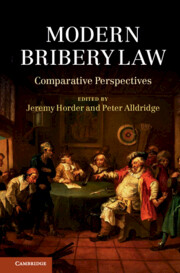Book contents
- Frontmatter
- Contents
- List of contributors
- Table of cases
- Table of statutes and international instruments
- Introduction
- Part I Bribery law: between public wrongdoing and private advantage-taking
- 1 Reformulating bribery: a legal critique of the Bribery Act 2010
- 2 Official and commercial bribery: should they be distinguished?
- 3 Countering corrupting conflicts of interest: the example of Hong Kong
- Part II Bribery without borders: tackling corruption in the EU and beyond
- Part III Ill-gotten gains: the challenge of prosecution, enforcement and asset recovery
- Bibliography
- Index
- References
1 - Reformulating bribery: a legal critique of the Bribery Act 2010
from Part I - Bribery law: between public wrongdoing and private advantage-taking
Published online by Cambridge University Press: 05 May 2013
- Frontmatter
- Contents
- List of contributors
- Table of cases
- Table of statutes and international instruments
- Introduction
- Part I Bribery law: between public wrongdoing and private advantage-taking
- 1 Reformulating bribery: a legal critique of the Bribery Act 2010
- 2 Official and commercial bribery: should they be distinguished?
- 3 Countering corrupting conflicts of interest: the example of Hong Kong
- Part II Bribery without borders: tackling corruption in the EU and beyond
- Part III Ill-gotten gains: the challenge of prosecution, enforcement and asset recovery
- Bibliography
- Index
- References
Summary
Introduction
The Bribery Act 2010 is an important step forward for the United Kingdom in terms of the legal response to corruption that takes the form of offering or taking bribes. An effective codification of the law of bribery has been achieved. The new substantive law of bribery in its entirety comprises just four offences. There are the two core offences of bribing another person and being bribed. Additionally, there is an offence of bribing a foreign public official; and an offence, confined to ‘commercial organisations’, of failing to prevent bribery. All previous statutory and common law offences relating to bribery are abolished. Aside from the bribing a foreign public official offence, there are no longer any differences in legal terms between proscribing bribery in the private sector or in the public sector. In particular, there are no presumptions of corrupt conduct in the case of public officials. For of all four offences, the burden of proof for all elements of the offence lies with the prosecution.
So, a new start, following a long and difficult gestation. For the two core offences of bribing and being bribed, there seems no radical extension of the previous law relating to bribery offences save for the possibility that when R extorts some payment or other advantage from P it may be easier under the new law to convict P of a bribery offence. What has changed significantly is the way in which the new offences are drafted. There is no longer the reliance on the evaluative terms ‘corrupt’ or ‘corruptly’. Instead, the new legislation identifies by description situations where financial or other forms of advantage should not be offered or taken. In other words the two new, core offences describe for the purposes of the criminal law what bribery is, confining the role of the jury to finding the facts that constitute the offence and establishing the culpability for the new offences by applying to the facts the less morally freighted concepts of intent, knowledge and belief. While inevitably certain interpretive uncertainties arise when the specifics of these offences are scrutinised, undoubtedly the two core offences capture very well the essence of bribery. Under the terms of the Act, at the core of bribery are inducements or rewards to persons with public or private responsibilities to perform those responsibilities improperly either by acts or omissions done in bad faith, or with partiality, or in breach of trust.
- Type
- Chapter
- Information
- Modern Bribery LawComparative Perspectives, pp. 13 - 38Publisher: Cambridge University PressPrint publication year: 2013



